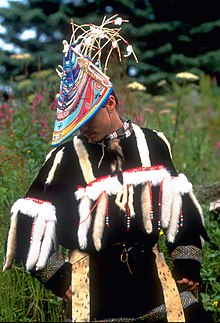
Back Супикал AV Supiklər Azerbaijani Сугпіят Byelorussian Alutiiq English Alutiiq Spanish Alutiiq French Pobo alutiiq Galician Sugpiaq Italian アルティーク Japanese ალუტიკები Georgian

Die Sugpiaq („wahre/echte Person“, Plural: Sugpiat - „wahres/echtes Volk“ - abgeleitet von Sug/Suk - „Person“ + -piaq (Singular) bzw. -piat (Plural) - „wahr“, manchmal auch Suuget - „Volk“)[1][2] oder Alutiiq („Person von den Aleuten, bzw. Aleut“, Plural: Alutiit - „Volk von den Aleuten, bzw. Aleuten“)[3][4] in South Central Alaska sind Ureinwohner Alaskas und eine der drei Stammes- und Dialektgruppen der Yupik (auch „Westliche Eskimo“ genannt).
Zu den „Yupik/Westlichen Eskimo“ gehören zudem die Yup'ik (Yupiaq) (Yupiaq - "wahre/echte Person", Plural: Yupiit / Yupiat - "wahres/echtes Volk") im Westen/Südwesten Alaskas sowie die Yupik (Sibirische Yupik / Yuit) (Yuk - "wahre/echte Person", Plural: Yuit, Yupighyt - "wahres/echtes Volk") auf der Tschuktschen-Halbinsel in Tschukotka und der Region Kamtschatka im Nordosten Russlands sowie bis zur Sankt-Lorenz-Insel in Alaska. Die „Yupik/Westlichen Eskimo“ und „Inuit/Östlichen Eskimo“ sprechen jeweils zwei Dialektkontinua (Yupik und Inupiaq-Inuktitut) der Eskimosprachen der Eskimo-aleutische Sprachen und zählen kulturell zu den Eskimo-Völkern. Als solche zählen sie gemeinsam mit den Aleuten (Alëuten) zum nordamerikanischen Kulturareal der Arktis.
- ↑ Alutiiq Language Dictionary
- ↑ https://alaska.si.edu/culture_sugpiaq.asp?continue=1 The Sugpiat and the Legacy of Western Conquest
- ↑ Report on Population and Resources of Alaska at the Eleventh Census: 1890 by United States Census Office - Alaska - 1893 (= The Kaniagmiut, to whom the Russians applied the name of Aleut)
- ↑ East Prince William Sound Landscape Assessment (PDF; 5,7 MB), Cordova Ranger District, Chugach National Forest. September 9, 2008 (= The term Alutiiq is the Sugtestun pronunciation of the Russian introduced name Aleut and is commonly used as a self-designation by the people of the Chugach region)